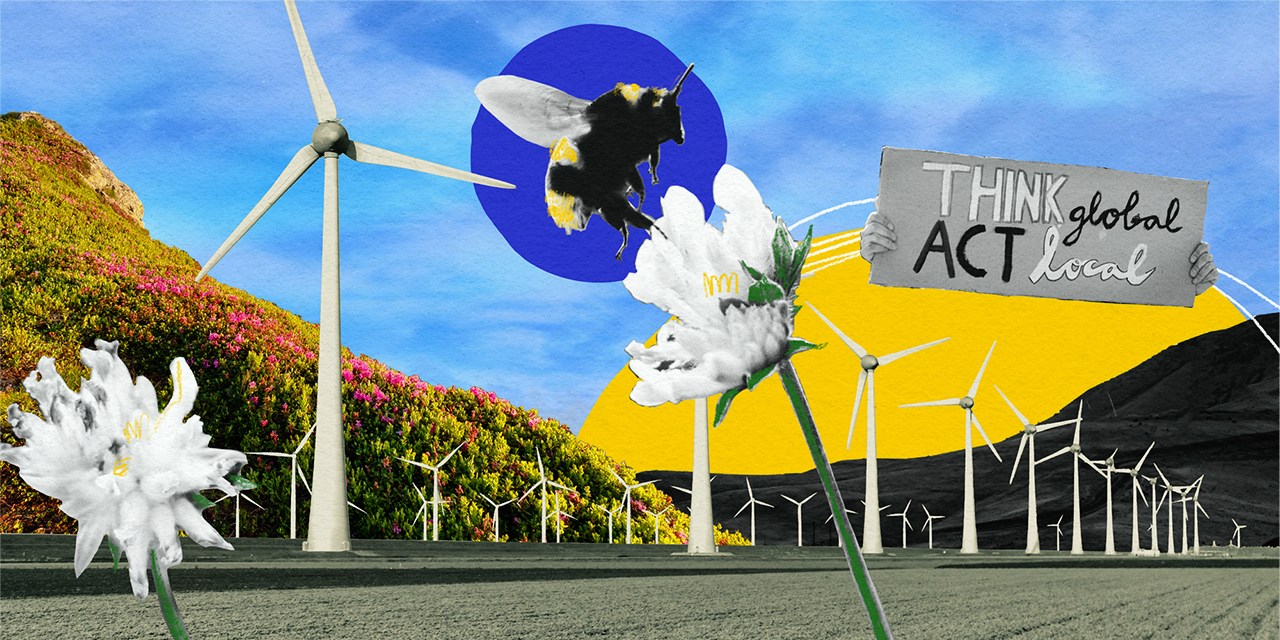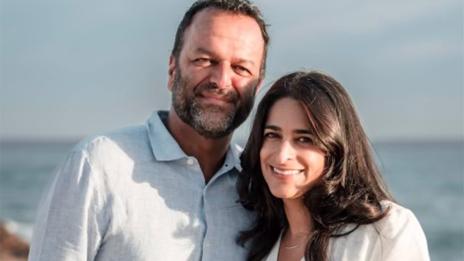By Eric Gallippo | Art by Adam Beeman
With a spring and early summer already marked by extreme weather, forest fires, and other signs of climate change, it’s no wonder many people feel it’s already impacting their daily life.
While there is no shortage of ways to lessen our impact on the environment, University of Michigan experts emphasize the importance of working together to make the large-scale changes that are needed.
“It’s more of a mindset or a way of living,” said Kelly Jones, sustainability programs manager for the Graham Sustainability Institute. “Instead of giving a checklist of things, I usually give some overall philosophies, or ways of living, because if you get this checklist, it’s little things here and there that’ll leave you feeling good in the moment, but what we really need are bigger, long-term changes.”
To get some ideas about what we can do to help slow those effects and live more sustainably, Leaders & Best spoke with Jones, who also leads U‑M’s Planet Blue Ambassador program, and Aimée Classen, director of the U‑M Biological Station (UMBS) and professor of ecology and evolutionary biology in the College of Literature, Science, and the Arts.
Nurture what you have, and share it
Remember: You may already have what you—and others—need.
Jones: I like talking about being content and nurturing things you already have. Preserve and maintain those things, and share them with people around you. Ask if you can borrow stuff, and let people know there are things you are happy to share. When we’re thinking about gifts, rather than material things, think about spending quality time together or experiences we can have with family and friends. Take a walk in a park or kayak down the Huron River, rather than spending your afternoon at the mall stressed out over getting them the right thing. These are some things you can do that are part of a philosophy of being happy with what we have, because we don’t need more stuff.
Classen: At UMBS, we develop programming where we share our knowledge about this place with other people who need to manage similar places, or just care about Northern Michigan. We hope through that shared love of a place, we can create the infrastructure to do a better job of conserving it into the future.
Be adaptable
Change is inevitable; we can meet new challenges with new ways of thinking.
Jones: When I think about being adaptable for a more sustainable lifestyle, I think about things like, “Can we work from home occasionally nowadays to lessen our transportation emissions? Could we try a four-day work week, depending on our jobs?” The important thing with this is you have to monitor your energy use at home, too.
Classen: When it comes to preserving biodiversity in our own yards, allowing things to flower and mowing your grass a little higher can be quite good, even if it’s just a section of your lawn. Insects and pollination are declining with climate change. What we really need is to preserve large tracts of land, but there are things you can do to help in your own yard by letting it go a little more wild and not using fertilizers and insecticides.
Jones: One of the most impactful choices everyone can make is what they eat. Beef is one of the most carbon intensive foods on average, so if we can eat more plant-based proteins, or even chicken or fish, that’s a great way to reduce our carbon impact and be adaptable to the climate change future that we have. And when you go out to eat, bring a reusable container to take home leftovers.
Build connections
We are the environment. And we do more good when we work together.
Jones: Speaking up, raising your voice, and advocating for the change you want to see is super important in terms of local elections, making changes in your workplace, making changes at your school. Join the conversations already happening rather than remake the wheel. Climate anxiety is very real, and research shows individual actions don’t help reduce that, but collective action—joining groups, clubs, green teams, nonprofit organizations, local watershed coalitions—actually does reduce climate anxiety and eco grief.
Classen: One of the things that worries me the most is public distrust in science, and how we’ve politicized this idea of change and warming. I spend a lot of time on how we can educate more students in science from a diversity of perspectives and communities to go back to their communities and share their scientific perspective in a way that makes us all better stewards of the planet.
The more we can bring people together to realize that they are part of the environment and they can learn from the environment, and then have conversations about how we interact with it and each other, the better we’ll prepare people to go out to their communities and have these sorts of conversations across a lot of different demographics.
Donors supporting sustainability
As Jones and Classen point out, systemic change takes collective action across backgrounds and disciplines, as well as long-term commitment and support. At U‑M, donor support has helped the university maintain its commitment to meeting the challenges of climate change, promoting sustainability, and advancing environmental research. Philanthropic gifts have helped establish U‑M’s Water Center, Erb Institute for Global Sustainable Enterprise, Tishman Center for Social Justice and the Environment, and Graham Institute, as well as research at UMBS, among others. Numerous scholarships, fellowships, faculty support, and research institutes and centers, have also been made possible by this generosity.
Talking about his philanthropy in Leaders & Best last year, Donald Graham (BSEIO ’55, MSE ’56, HDEng ’09) said: “Not only have we fostered and facilitated new partnerships between University of Michigan scholars from across the schools and colleges, but we have brought that expertise to the communities that can use it. In turn, we have learned from those community partners and, as a result, our real-world impact is new interventions, better use of resources, and development of pathways to a more sustainable future.”


